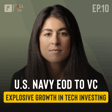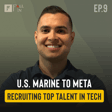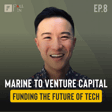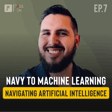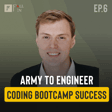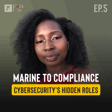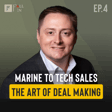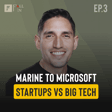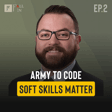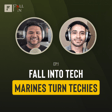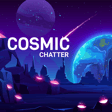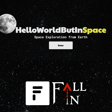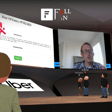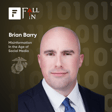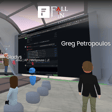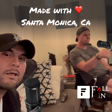Become a Creator today!Start creating today - Share your story with the world!
Start for free
00:00:00
00:00:01

Team Kilo's "Spaceify" Streamlines LETF for Aerospace
USAF vet Angie Parker, SWE Becky Richardson & USMC vet Blaise Pascual built Spaceify, an AI-powered LETF-optimization tool to cut launch delays & costs in commercial space. Digitalizing the complex paper process, Spaceify's MVP saves aerospace companies time & money.
With space industry family ties, Angie shares customer insights that shaped the lean team's focus. Becky discusses tech challenges, quick collaboration & an ambitious roadmap to grow with the booming industry.
Tune in for Team Kilo's journey, space passion & veterans advice for the Fall In hackathon!
https://spacify.org/
Github: https://github.com/AGI-CEO/team-kilo
Transcript
00:00:01
Speaker
All right.
Introduction to Team Kilo
00:00:02
Speaker
Welcome listeners to the fall in podcast. We're joined by team kilo, uh, who placed a third in our previous hackathon that just got finished, uh, may 17th of the 19th. So yeah, we're here with Angie and Becky. Um, Angie, do you want to kick us off by telling us a little bit about your background, um, what you did in the military and.
00:00:29
Speaker
And then, uh, yeah, we'll go from there. Yeah, sure.
Angie's Startup Journey
00:00:33
Speaker
Uh, my name is Angie Parker. I'm originally from the space coast area of Florida. Um, and I am also an air force aviator veteran.
00:00:44
Speaker
by way of the Air Force cross-landed in the Seattle area and just happened to stumble into startups. And so for the last 15 years, I've got experience with startup ops and executive support for kernels, CEOs, founders, and also a two-time founder myself. And so by day now, I am a chief of staff for a very early stage
00:01:12
Speaker
B2G, so government military startup. Very nice. And I want to unpack. So you said you worked with two previous startups before. Could you talk a little bit about what industry or what sort of the product line looked like for those? Yeah, so my first startup, Canopy, was a knowledge management tool, first originally designed for students, college students.
00:01:42
Speaker
When you're doing online research, you can save a million tabs open or you can save a thousand bookmarks. But like, how do you revisit and go, oh, I wanted to grab this from that or that image from here. You know, so I wanted to give teams, you know, college is a lot of teamwork, teams and ability to gather information online together.
00:02:04
Speaker
and have it build out your project. So that was Canopy. And then my second startup was called Kiko, which stands for kindness in, kindness out. And that was a mental health app with an AI support tools aimed at veterans actually for mental health. And so we were a small tool that facilitated small peer groups because at the end of the day, people helping people is really how we get through life.
00:02:34
Speaker
as well as building some AI self-awareness tools. Yeah. Right on.
Becky's Career Path
00:02:43
Speaker
Becky, you want to go next and share your background? Sure, absolutely. I'm Becky Richardson, and I live currently in Murray, Kentucky. I worked for, well, first let me start, I'm a military brat.
00:02:57
Speaker
My dad was Army and then converted to Air Force. And so I definitely have military in my blood. I ended up being a federal contractor and I worked for a unit called the Warrior Transition Unit. I was a recreation therapist, so I did adaptive sports for wounded, ill, and injured soldiers and veterans. Anyone who's ever heard of Warrior Games, I helped train up for those. I've been to several Warrior Games as well.
00:03:26
Speaker
I was at Fort Carson for two years, and then I was at Campbell for six. So during that time, I absolutely loved it. And I saw a need in the tech space, especially with a lot of nonprofits, like veteran nonprofits that had a gap in their, basically in their tech.
00:03:46
Speaker
A lot of them couldn't afford to hire software developers or teams, things like that. So I actually started picking up software development as a hobby. And then I ended up career switching as a software developer January of 22. And then I have worked for two startups and they are both
00:04:07
Speaker
in the HR tech space. So one of them was a tool for the hourly workforce and basically used AI and kind of asked questions to make sure that candidates would fit within teams for keeping people on staff longer and things like that, and that they're a good fit. And then also,
00:04:37
Speaker
The second company that I worked for was more the middleware, so I was on the integrations team, and that's for ACA and I9 compliance, eVerification, things like that. Very cool. It's interesting that you have this background in HR because I'm noticing this trend in so many HR companies that are diving into SaaS products.
00:05:02
Speaker
I've heard of Bamboo, HR, there's Lattice, which I think the founder is Sam Altman's brother, Sam Altman from OpenAI. He's also working on this HR tool. I think since you've already developed this background and experience, it might be worth looking into other HR companies that you could potentially be a good fit for.
Inspiration from NASA Family
00:05:30
Speaker
But I want to dive into the hackathon. And it sounds like Angie was the brainchild behind this project. I'd love to learn how or what inspired you guys to tackle the LETF process challenges. Yeah, so growing up on the space coast, all my family works at NASA or retired from NASA in some shape or fashion and
00:05:59
Speaker
I didn't realize how much institutional knowledge I had absorbed about the space industry until recently in the last few years, just talking amongst others. And they're like, oh, you really know a lot. And I was like, I guess I kind of do. So when I heard about the hackathon being space themed,
00:06:19
Speaker
I just pinged a couple of my relatives and my aunt Diane actually had some really great ideas that resonated with me and sounded interesting for the Akthon. So I chatted with her a couple of times and got all of her ideas and put them into the Slack channel. And we fell upon this one because we felt like it was an easy enough fix to
00:06:43
Speaker
to bring into the modern era a process that's still paper and in-person meetings. And so I guess the short of it is Spaceify is developing a new launch approval experience to help space companies and space manufacturers, whether that's a widget or a satellite, pass these required LETF or launch equipment test facility hurdles with ease while saving time and
00:07:11
Speaker
hundreds of thousands of dollars in engineering costs and test costs. Great. I see that the website is actually published and it's hosted. Have you had a chance to show your aunt, Diane, the actual final product and get her thoughts on it? No, not yet. She's working second shift and we're on different coasts now and so it's hard to sync up, but I did send her the recording and I'm curious to get her feedback. Yeah, me too.
00:07:43
Speaker
I think she was just tickled that I had reached out to her too, because it was a fun thing for us to do as family. Yeah, that's so wild that, you know, you've got this family background that's full of NASA employees. Yeah, some are like rocket scientists, they're just geniuses. Although, you know, sometimes can't tie their own shoes, but you know. Yeah, it's funny how that works.
00:08:11
Speaker
Yeah, no, it sounds like it's a great time to be in space, like commercial space, government space. You know, there's so much activity happening. Yeah, commercial space has really changed my hometown too, because there was a big lull after the shuttle closed down. And now civilian space is really bringing back the life in my hometown. Great.
00:08:36
Speaker
Yeah, it's going to be an incredible future with commercial space. And it's really, it feels unreal to have this so much activity around commercial space happening like in our lifetime. Yeah. You know, you start to like get that imagination spark happening again. Becky, I've got a question for you, which is how did you guys mesh with your team
00:09:03
Speaker
after everyone coming together during the
Team Dynamics in Hackathon
00:09:06
Speaker
hackathon. What was that like? It was great. We worked together incredibly well. I actually came into the team because my previous team had dissolved
00:09:20
Speaker
So I came in after they had kind of already been talking pre-hackathon and kind of coming up with ideas. But I mean, Angie Blaze and I worked really well together. I think we just kind of had a similar mission and we were just going to figure out how to make it happen above all odds because we definitely had the smallest team. But yeah, I mean, we just
00:09:47
Speaker
Really we're on the same page. We weren't afraid to ask questions and we were just, you know, very like communicative. Like we were able to just figure it out. I guess it's the best way that I can, I can say. Yeah. And, you know, with this hackathon, you know, somebody came, it sounds like somebody came in with a great idea, you know, they've,
00:10:14
Speaker
they're able to like reach out to actual family members to do customer discovery. What were some of the biggest obstacles that you guys faced during the hackathon? Was it something technical or non-technical?
Technical Challenges and AI Solutions
00:10:29
Speaker
What was that like? Hmm, biggest challenge. I think that might be a technical thing. What do you think, Becky?
00:10:41
Speaker
Yeah, I think also because it was government related.
00:10:46
Speaker
we didn't actually have access to everything that we needed. So a lot of things were, you know, just- Right, it's the weekend. We couldn't call somebody up and be like, hey, how did you do a job? Well, and I'm sure some of it's even classified, you know, it's- Right, right. We're just not able to get that information. So we kind of took what we knew and then all of our backgrounds of being on the inside of, you know, either being in the military or working for the military. And we were just like, okay,
00:11:13
Speaker
at least for an nvp this is what we can do and then i would say another challenge was just for me kind of switching to a tech stack that i hadn't used before and especially like ai i hadn't really dove into blade.
00:11:30
Speaker
phenomenal and being able to explain things and, you know, catch me up quickly. And, you know, we were on, all three of us were on a call all day, just really kind of teaching each other and getting each other up to speed. But yeah, I would say not having full inside knowledge and accurate numbers and things like that was probably the hardest thing besides the tech stack.
00:11:55
Speaker
Yeah, that was frustrating. On a very short timeline. Right. Because I love customer discovery. And I will just, I will, I'm the person who will just call a stranger. You're like, hey, you don't know me. Can you help? And I just, you know, weekends couldn't do that. And one aunt and one, you know, uncle, like, Hey, how do you do this thing? Only went so far, but it did get us far enough and definitely insights into a real problem to be solved, you know, job to be done. And, um,
00:12:24
Speaker
there's hundreds of thousands of dollars to save these space companies. And like you said, it's a booming economy in the civilian world and the more entrants are gonna need to go through this process. And it's just a paper and in real life nightmare. So it's just right for the taking. Becky, you mentioned a little bit of AI that Blaze was kind of developing
00:12:53
Speaker
How would you say the AI solution was used to streamline the LETF process? It actually did it in a lot of different ways. We had to come up with different parameters for different testings. I believe Angie said there's over 50 tests that they're able to do.
00:13:19
Speaker
So we just picked three and then Angie did a bunch of research on what those parameters were, you know, kind of like what would hourly costs be, things like that. And then in the background, Blaze was taking that and entering into the AI so that you can put parameters in there and it would actually go behind the scenes and calculate for us. So that that way we weren't having to come up with really complex
00:13:47
Speaker
math problems and how to solve them, the AI was doing it for us. And then also kind of going back even to with the amount of time we had and how few of us there were, it was just blazing eyes with two devs. We also use the AI
00:14:04
Speaker
to help us with the site so that we could get an actual MVP out and have a close to finished product, at least enough where we could do a presentation on what was going on, even if it wasn't fully functional. Yeah, Blaze really showed us a lot. He opened my eyes on how much one person can do nowadays with all of these tools.
00:14:28
Speaker
I was just blown away. Just blown away. Even just a team of three, we didn't kind of maybe even need more people. And that was fascinating to see his use of it. He really was pushing the limits on what's new and out there. And it was fascinating. Yeah, I'm pretty stoked to have him on as well. I know he had a scheduling conflict, but yeah. You definitely want to try to push. 100%.
Customer Discovery and Insights
00:14:59
Speaker
He needs a podcast on his own. Agreed. Yeah, Angie, touching back on customer discovery, you mentioned that you love to do that. Can you share any insights in terms of customer discovery that you were able to pull from speaking with your Aunt Diana? Yeah, Aunt Diane. So no worries. That's all good. Yeah, so customer discovery is it's crucial that you do not lead the witness.
00:15:30
Speaker
And I always key in on emotions. And so when Diane was telling me about all these LETF engineers and technicians getting in the room with the space company engineers, and they were literally fighting, like verbally fighting and name calling in a meeting, I was like, you key in on emotions where people get really upset or really frustrated or really happy.
00:16:00
Speaker
And so I just kept asking why. Um, and that's another trick too, is that you, you've got to, you've got to dig in on the emotions and you keep asking open ended questions, including why, you know, why does this matter? So yeah, I can talk all day on that. Cool. And then Becky, what, what was your experience like compared to the past hackathon that you've been to anything?
00:16:30
Speaker
that you can relate from, I remember you attended the veterans
00:16:38
Speaker
Was it the homeless hackathon? So I did the homeless, the Ukraine, and then I think it might've been, I don't know if it was your first one or one of the earlier ones where I think it was just open-ended and just anything for veterans. So I was one of those three before. So how would you say, yeah, any of those,
00:17:07
Speaker
past experiences contribute to what you built that space of fire? I would say this probably was my least amount of knowledge. I'm definitely not an SME in space at all. I think space is fascinating, but I know nothing about it.
00:17:31
Speaker
But Angie actually pointed that out as a strength because I was kind of beating myself up going, Oh my gosh, I'm not contributing. I'm so sorry.
00:17:39
Speaker
She was saying that because I don't have insight to it, I'm a pair of fresh eyes. And so I was asking questions that she wouldn't think to ask, even on what's being tested, because my brain's going, oh, it's rockets. And she's like, no, it's more like satellites and the parts of things that are a lot smaller. And so that changed my perspective. So really, I think we were able to actually get deeper into what we needed.
00:18:06
Speaker
because I had the fresh eyes, but then also just little things like presentation, because I definitely, my first hackathon, I ended up being the team leader, even though I didn't want to, and I was terrified. And I remember how fast the five minutes goes by. And I also remember the demo broke.
00:18:29
Speaker
It totally worked before the demo. So at least when we were trying to come up with those type things, I was able to say, hey, just from experience, let's try one person speaking and this type thing. So I'd say that was it. And then also,
00:18:49
Speaker
just not stressing about things and just having fun and building something cool together because I've made some great friends from these hackathons and this is by far my favorite hackathon and pretty much the only one that I do. Awesome. Great. Angie, what would you say would be the most exciting moment during the development process and then the hackathon itself?
00:19:18
Speaker
For me as an entrepreneur, I find it infinitely fascinating to take a problem that exists in the world and make a thing to solve it. And I think for me, it was extra special that it was working with a family member and in my hometown industry, right, and doing something
00:19:38
Speaker
with these two folks that I had never done before either. So it was just all of it, frankly. But yeah, it was extra special with making a thing and solving a problem in the real world for a family member. Would you follow the same sentiments, Becky, or do you have anything that sticks out as the most exciting part during the development process here?
Mission-Driven Project Significance
00:20:02
Speaker
I would agree. I think being able to help Angie out and knowing that this was part of her family, it gave a mission behind it. And it was a very close mission. Like the other ones, you knew there was a mission, but this one was a lot more personal. So I think that kind of spoke volumes on things. And so I would say that was really, really meaningful in being able to be part of this one. Customer empathy, they call it. 100%.
00:20:33
Speaker
Cause any of us who have worked for the government or, you know, we, we know what it's like behind the scenes and how that process can be long and tedious. And if you get one, no, you have to start from scratch again and go back up the ladder and it's just not a fast process. So yeah. Yeah, totally. And this is a question for both of you guys, but you know, hypothetically, let's say you had, you know, another.
Vision for Spaceify's Future
00:21:01
Speaker
you know, a few days to maybe potentially a few weeks. How do you guys envision Spaceify evolving? You guys did have that time. We had a fun roadmap. Like we, you know, I joke that I'm an ideas man.
00:21:18
Speaker
I was seeing where this could go at every stage, and I'm still noodling on it in my head, and it definitely has legs, and it's not just that the launch equipment test facility, LETF, processed to just get in there and get your thing tested and get into a launch vehicle, but it's that there is only one LETF.
00:21:42
Speaker
So what if there was civilian LETFs and what if we put one in central Florida to take advantage of the engineers that exist there and Virginia and Texas and California, Ohio? I could imagine this being not only a software tool that makes a process more efficient and cost efficient and time, but also
00:22:05
Speaker
why not make more LEDs and make them better? Just like SpaceX made launching rockets and every day, every other day turn and burn thing that NASA, the government couldn't do. Why can't civilian do the same thing for the LETF process? But don't tell Elon Musk that because I still want to do this idea.
00:22:29
Speaker
you know, there's some, you know, we were talking about before we hit record that there's so much activity going going on around space. What would you guys say is like the most exciting thing about space that that sticks out to you. And we've got like a long pause remover. So no worries. Yeah. I would say it's more accessible. Like it's not you know, like
00:22:56
Speaker
just kind of going off of what Angie was saying, it's not just the government and NASA anymore. Seeing what Elon Musk has done and how these civilian companies are actually competing to go into space. And it's like, who doesn't dream about that when they're a little kid or even as an adult on the possibility of what's out there besides here? So I think it is cool to see
00:23:26
Speaker
just such a buzz around it and how much growth could actually happen with it. Like it just, you can't help but dream big with it and see all the possibilities. And you know, even to what Angie was saying, like we got so excited talking about like, Oh gosh, like this, we could actually bring this idea into a reality. So yeah.
00:23:50
Speaker
I would echo the same thing as well as I didn't realize how much I grew up with my windows shaking and our car alarms going off from the shuttle launches and hearing the big sonic booms on its return, waking us up and scaring the crap out of us in the middle of the night. But I just took that for granted and that awe inspiring. And it's still just not only can you physically feel it in your chest, but
00:24:19
Speaker
It is amazing to see a launch. And you're just thinking, wow, humans are doing this amazing thing and taking us so much farther than our Earth and sharing that and having that be more accessible to more and more and more people and having this spread to launch sites in Virginia and Texas and California. It is more accessible. It is more exciting. And bringing that to the masses
00:24:49
Speaker
It's exciting to share that with others. Yeah. You know, I've only been exposed to stuff like that in the movies. You know, I've never seen a shuttle launch before. It's funny. Jake Schneider, who was our Space Force speaker, told me that, you know, we're definitely going to plan to go watch a launch sometime. And that got me super giddy and I can't wait for that to happen. Oh, I can't wait for you to get that experience. That's awesome.
00:25:16
Speaker
I can't even imagine what it would feel like, like the sensation, the sights, the sound, all of that. You'll want to record it. And of course, everyone wants to record it. But also, I would say, don't forget to step back and experience it outside of a camera lens or in your phone. It is truly awe-inspiring. Yeah.
00:25:40
Speaker
speak enough because like I did mention I only witnessed these types of launches and events in movies. Do you guys have a particular space movie or show that you want to give a shout out to? I can't watch them. They're too personal. I get wildly emotional. Like I just can't. Isn't that weird? No, not at all. It just goes to show how much like you grew up with space really.
00:26:10
Speaker
Yeah. Like sometimes I'm logging and some have fishing and I don't know manufacturing, but for us it was space. And like my grandfather shook the hands of, you know, astronauts on their way. You know, it's just, I just, no, I can't. Yeah. Too much. I was going to say something about space movies do like hit you in the chest, like every single one that I can think of.
00:26:40
Speaker
like one of my couple of my favorites is like contact with Jody Foster. And then that one because it wasn't as like space industry. I agree. That is a great one. I agree. Yeah, I don't know about that one. What about you, Becky? Any any movies or shows that jocked your mind here? Let's see. There's so many good space movies like I actually when I started thinking about it.
00:27:11
Speaker
Interstellar was really good. There's another one. I can't think of the name of it. It was the women that actually did all the statistics for the launch and their story. I cannot think of the name of that movie, but that one was absolutely phenomenal. What's the name of that one? I know what you're talking about. Yeah. Yeah. I'm drawing a blank myself.
00:27:41
Speaker
If it pops up, we can mention it on the pod. But going back to the actual plot. Hidden numbers, right? I think. Hidden figures. Hidden figures. Hidden figures. That's it. I was googling it. Oh, that's right. So yes, hidden figures. No, you're fine. That was it. Yeah, no, I'll have to check that out again. It's been a while. I know there was a recent space movie that came out.
00:28:10
Speaker
on, I think it was like Amazon. It was about one of the astronauts who was like a migrant farmer in Texas or California and used to just like, as he was working in the farmlands, kind of just like grew up watching these space. You know what I'm talking about, Becky? A million miles away.
00:28:35
Speaker
A million miles away. Did you get a chance to check that out? Yes, that one was phenomenal too. Yeah. Don't watch it, Becky. Or don't watch it, Angie. You'll probably start tearing up. I teared up a bit. So, warning. Noted. Yeah. It's a good one though. Yeah. I kind of have friends and family around me that vet them. I'm like, wait, what's it about? Really? Oh, okay. I might be able to watch that, but maybe not. Cool. So yeah, going back to that hackathon, it's three days.
00:29:05
Speaker
How did you guys manage the allocating of tasks between just literally the three of you guys?
Effective Team Collaboration
00:29:14
Speaker
Yeah. Seemed to flow pretty naturally. I knew what I could do, and vice versa. And Blaze originally was going to do team lead. And I was like, hey, do you think you have time for doing that in addition to being a dev?
00:29:34
Speaker
He's like, Oh, that's a good point. Yeah. So then, then I, you know, took that on and that just was an easy, seamless, like no hard feelings, like nothing problematic interpersonally, right? So it just was what needed to be done. And
00:29:51
Speaker
I think we did a great job too of just being like, I can do that. I think you're the best for that. And like always at the end of our meetings, like summarizing like next steps and then translating into to do items. And so we had tons of accountability, very easy communication. Like honestly, this is coming out of, you know, going back to college days, like group projects you just are thrown together with folks.
00:30:16
Speaker
This was an amazing team to be thrown together with, like we just gelled immediately. So. Yeah, I'll agree with that and just kind of like adding it. We everyone was just so flexible, you know, and it's just like Angie said, we just gelled so well and we were really good at pointing out each other's strengths as well. And just, yeah, I mean, this was one of
00:30:45
Speaker
the easiest teams I've been a part of, and whether it's been professionally or even in school and college, things like that.
00:30:57
Speaker
Yeah, we just figured it out. And then also if someone wasn't able to do something, there was nothing like someone else picked it up. You know, it wasn't kind of like, Oh, you're a slacker. It just, we just figured it out. We all knew we had the same mission and it was great. Like I can't say enough good things about our team. Like I would totally work with them again. Yeah, me too. Nice.
00:31:23
Speaker
What would you say would be the most surprising thing you've learned about the entire LETF process?
Challenges in LETF Process
00:31:31
Speaker
I think that paperwork documentation we saw, Vicky, I was like, are you kidding me? This was 10 pages of like the most craziest documentation. And it was the, it was, I don't know if you noticed, Vicky, that that was that set of paperwork was the ninth iteration.
00:31:49
Speaker
of back and forths with the LETF and the space company that was getting their widget tested. It was the ninth iteration. And the numbers on there were like $6 million for just this one thing to get tested. So it's cumbersome. And I was just shocked. But then it also, being military, it shouldn't shock me that something is a terribly documented process with the government. It shouldn't shock me, but it still does.
00:32:17
Speaker
So that for me, I was just like, what? Yeah, I would say that document with it being the ninth generation and also finding out about them getting into a room and arguing. I mean, going wrong, I've been part of a few of those before on a lower level.
00:32:44
Speaker
you know, but just the process in general and how cumbersome it was. And not only that, but it's also keeping these engineers from doing what they do best. So like something where that's so critical to be tested because there's, you know, spaces just, it's not anything, you know, it's, everything's rigorously tested, you know,
00:33:13
Speaker
just having trouble finding words, but something so important and valuable and things like that. There's so many ways for it to be streamlined and still be secure, to let the engineers do what they do best.
00:33:32
Speaker
So yeah, that process just was mind blowing. Um, cause we got to hear a little bit of a call from, you know, Angie and her aunt and stuff and hearing her describe it. It was just like, wow. Yeah. That's awesome. Um, as we wrap up here, do you guys have anything else to mention about specify that we might've missed, um, anything in particular you want the audience to know about?
00:33:58
Speaker
I mean, that that process exists. And if you want to go to space, you got to get approved and that's not an easy thing. And so there are a lot of space startups and I commend them. I want them to keep going. And I hope that they also know that there is this process ahead for them and hopefully we'll be around to make it a little easier. Yeah. I would also say,
00:34:27
Speaker
you know, a lot of times when you're also coming up with an MVP, you want it to function a certain way. And sometimes there's just not enough manpower or time to do it. So you just kind of say, this is the intent, even though this is how it doesn't work yet. But, you know, I have a feeling that hopefully we can continue with this process and
00:34:50
Speaker
that we actually turned something. I think we really did find the minimum set of functionality and features that someone would really pay for, that companies would really pay for to streamline that. So that was, for me as an entrepreneur, that was exciting. We really nailed like a real no shit. This thing right here, this is the minimum set of features that someone really needs no matter how slow it might be. It's got to go to space.
00:35:20
Speaker
they'd still pay for that. Yeah, I think, you know, for previous hackathons that were really close to having like a very finished project, I recommended them to check out some of the, you know, accelerators that are local. You know, there is an accelerator that partnered with fall in. They are called the
00:35:47
Speaker
It's called the Founders Institute. I recommend it. If you've never been in the startup world and you're an engineer or a developer, I highly recommend it because there's part of that startup process of talking to customers. I think you can tell that I'm not an engineer, I'm not a developer.
00:36:08
Speaker
that you need to find a co-founder or an early stage joiner like me who will just pick up the phone and call people because you might think you have a great idea and as an engineer I know and I've got friends, best friends, partners that are engineers and so like I know you just get excited about building a thing. You might be building
00:36:31
Speaker
the wrong thing. Talk to customers and accelerators force you out of the building and talking to customers to find that minimum set of features that art people are willing to pay you for. And you might be really close. But talking to customers gets you so much closer, so much faster. So if you have a great idea, I highly recommend if you're not in the startup world and you don't live and breathe zero to one,
00:36:57
Speaker
that you do an accelerator with your idea because you need to find the non-engineering folks to partner with for business plan and customer development. Yeah. Yeah, absolutely. Yeah, I guess my last question is, do you guys have any tips or advice that you'd give the future fall in hackathon participants? Find a good team. Or if you don't find one,
00:37:26
Speaker
treat them as your best friends, talk to them as if they were your best friends. And I think you'll go really far because kindness in, kindness out, that often breeds kindness from others. And so give others grace, but also take responsibility. And I think veterans are good at that.
Advice for Future Hackathon Participants
00:37:48
Speaker
That'd be my advice.
00:37:50
Speaker
Yeah, and I would say too, especially on the tech side, even if you don't know something, that's okay. Courage is doing something while scared. You're going to learn a lot and it's a really supportive group.
00:38:09
Speaker
You know, one of the mottos from the warrior transition unit at Fort Carson was rise above, find a way. And again, that's what I think a lot of military and those that have worked with the military are good at.
00:38:22
Speaker
So I think you just never know where something's going to lead. And so just don't be afraid to try. Um, cause it can be intimidating going, Oh gosh, I don't know that much, but you'd really be surprised at what you can offer and what you can actually end up doing and learning. So I'm taking them with you forward. Yeah. That's well said. Right on. Yeah. Before we ended, you guys, everything to plug.
00:38:51
Speaker
Yeah, Vettorati. I'm a mentor for Vettorati. So if you need help transitioning from military service into the civilian life, I highly recommend it. It's totally free. There's a ton of mentors on there, myself included. And even on my worst days when I'm actually talking to like a lieutenant colonel transition, I'm like, how in the heck could an E4 help a lieutenant colonel? But really listening and having, just lending an ear and
00:39:16
Speaker
Being supportive can go a long way, but now there are real experts out there on Betterati that, you know, my expertise is entrepreneurship. So if that's something that other veterans or transitioning members are into, I highly recommend Betterati free mentors. Nice. Yeah, I would say also to find ways to get involved, you know, find your tribes and people that get you.
00:39:45
Speaker
You know, there's lots of resources out there, whether it is, you know, in tech or
00:39:54
Speaker
if there is something that you want to do, even like outdoor sports or, you know, that's me coming from that type of background as well. Just find people to get involved with because especially once you transition out of the military, you just kind of lose that camaraderie that you used to have and that family and a lot of people don't get that, but there are a lot of people that are like you.
00:40:19
Speaker
And there's tons of groups out there. So don't be afraid to get involved and find those groups because one group will lead to another group that will lead to another group and then you'll never be alone. Yeah. Love it. And there's even one for veterans interested in startups. So there's something for everyone. And it really does take people. We really need other people. And don't forget that. Cool. I guess we'll end it right there. I couldn't have said it better myself.
00:40:49
Speaker
That's the part, everyone.
